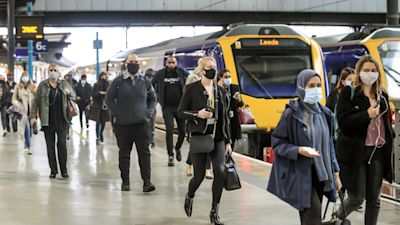Shake up of privatised railways as customer numbers drop during coronavirus pandemic

Britain's railway system is facing a shakeup as the Transport Secretary declared the "model of privatisation [...] is no longer working" since the coronavirus pandemic hit passenger numbers.
Emergency measures introduced to keep the country's rail franchises operating during the Covid-19 crisis are being continued, signalling the end of the current privatised system.
The Department for Transport (DfT) has taken on franchise holder's revenue and cost risks since March, at a cost to taxpayers of at least £3.5 billion - and has warned "significant taxpayer support will still be needed".
The move is being branded "the first step in bringing Britain’s fragmented network back together".
Operators have been moved to “transitional contracts” ahead of the creation of a “simpler and more effective structure” to be developed over the coming months, according to the department.
Transport Secretary Grant Shapps was blunt in his assessment of the current system: "The model of privatisation adopted 25 years ago has seen significant rises in passenger numbers, but this pandemic has proven that it is no longer working."
ITV News Correspondent Sejal Karia has more:
Mr Shapps said the new system will "demand more for passengers" by simplifying journeys and "ending the uncertainty and confusion about whether you are using the right ticket or the right train company".
He continued: "It will keep the best elements of the private sector, including competition and investment, that have helped to drive growth – but deliver strategic direction, leadership and accountability.
“Passengers will have reliable, safe services on a network totally built around them. It is time to get Britain back on track.”
Pressed on how the changes will work, Mr Shapps said the new rail management contracts will only pay out when trains run on time.
The transport secretary told ITV News an end to the "very complicated franchising system" had always been something the Conservatives were planning on doing, but that coronavirus had "hastened" the move.
Mr Shapps said the system had become "too complex and too difficult for the passenger to navigate".
When asked on BBC Breakfast if giving providers a flat fee would incentivise operators to make improvements he added: “They are given a flat fee but a very large chunk of that is based on delivering passengers to their locations on time.
“So if they don’t deliver, if they don’t get people there on time, if they don’t run a clean service that people can be confident in, then they won’t get that management fee, so there’s a huge incentive.
“With the old system you could fail to run trains on time a huge amount of the time and still earn profits for doing so – that’s what’s ended today, these management contracts will pay only when they do their job and do it really well."
Mr Shapps added he could not have a situation when the railways were not running and key workers are not able to get to work.
Quizzed on how the the new rail measures will be paid for, the transport secretary added: "As with everything else related to the coronavirus we are having to pay the money into it and we are anxious to get a recovery in our railways.
"But I can’t have a situation where the railway are not running and not allowing our key workers to get to work, our NHS staff, or indeed people able to travel safely with enough capacity to get to their jobs."
Rail firms will continue to be paid a management fee for running services, but under the ERMAs it will be a maximum of up to 1.5% of the franchise cost base, rather than 2% under the Emergency Measures Agreements introduced in March.
Tan Dhesi, Labour’s shadow rail minister, welcomed the move to bring in "greater public sector involvement in managing the railways."
"But today’s agreements mean taxpayers are set to continue paying hundreds of millions of pounds in profit to private rail companies to run the network. This is completely unacceptable," he said.
“These agreements paper over the cracks of a broken rail system. It’s time to put passengers before profit and bring our rail franchises back into full public ownership.”